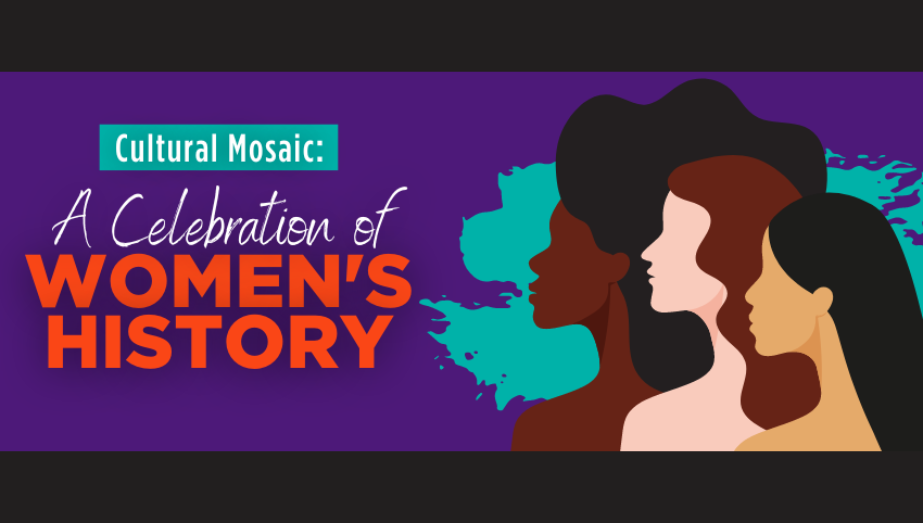To commemorate National Women’s History Month, ACC highlights some of the outstanding women who work, teach, and study at the college throughout the month of March. These women were nominated by their colleagues based on their accomplishments.
This year’s national theme is “Celebrating Women Who Tell Our Stories.” It recognizes women, past and present, who have been active in all forms of media and storytelling, including print, radio, TV, stage, screen, blogs, podcasts, news, and social media.
For a list of events happening this month at ACC, visit the Cultural Mosaic: A Celebration of Women’s History website.
Dr. Lorlie Ellis
Dr. Lorlie Ellis (she/her/hers) is ACC’s dean of Business Studies and has worked at the college for more than five years.
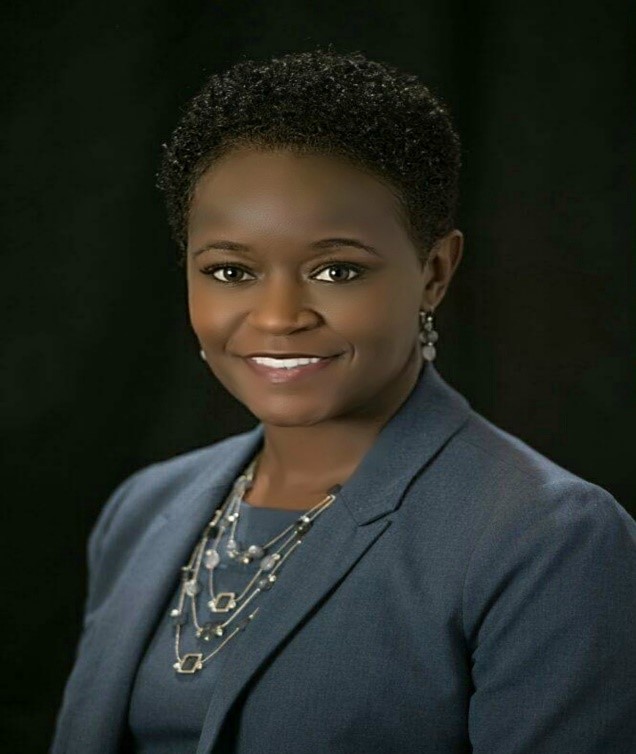
Why do you think it’s important for the college to commemorate Women’s History Month?
Women’s History Month is an opportunity to recognize and celebrate the contributions of women throughout history and their impact on society. It is a time to reflect on the progress made in advancing gender equality and the work that still needs to be done. By commemorating Women’s History Month, the college can promote awareness and education about the experiences of women and their accomplishments in various fields, including politics, science, literature, and the arts. This recognition helps to inspire future generations of women to pursue their dreams and to break down barriers in their own lives. Additionally, recognizing and honoring the contributions of women promotes a more inclusive and diverse learning environment, which benefits all ACC employees.
This year’s theme is “Celebrating Women Who Tell Our Stories.” Who is your favorite female storyteller?
Nikki Giovanni is an American poet, writer, commentator, activist, and educator who has been sharing her stories and experiences through her work for over five decades. She is known for her insightful and poignant poetry, essays, and children’s books, which often explore themes related to social justice, gender, race, and identity. Throughout her career, she has been recognized with numerous awards, including the Langston Hughes Medal, the NAACP Image Award, and the Rosa Parks Women of Courage Award.
Giovanni’s storytelling has had a significant impact on the literary and cultural landscape, and she continues to inspire and empower readers and audiences around the world. She has also been a trailblazer for women and people of color in the media, breaking down barriers and paving the way for future generations of storytellers.
Do you have any books, films, podcasts, etc. to recommend for Women’s History Month?
Books:
- “Their Eyes Were Watching God” by Zora Neale Hurston
- “Educated: A Memoir” by Tara Westover
- “Beloved” by Toni Morrison
- “I Know Why the Caged Bird Sings” by Maya Angelou
- “Becoming” by Michelle Obama
- “Sister Outsider” by Audre Lorde
- “Homegoing” by Yaa Gyasi
- “The Hill We Climb” Amanda Gorman
Films:
- “Hidden Figures”
- “Joy Luck Club”
- “Bessie”
Podcast:
- The History Chicks
- FriendLikeUs
- Thank Her Now
What is one challenge women still face when it comes to equality today?
One challenge that women still face when it comes to equality today is gender-based pay inequality. Women continue to earn less than men for the same work, despite equal education and experience levels. According to the World Economic Forum’s 2021 Global Gender Gap Report, women globally earn just 68% of what men earn, and it is estimated that at the current rate of progress, it will take another 135.6 years to close the global gender pay gap. This wage gap affects women’s financial independence, their ability to support themselves and their families, and can have long-term effects on their career prospects and retirement savings. While progress has been made in many areas of gender equality, the persistent gender pay gap highlights the ongoing need for action and advocacy to address this issue.
Name a woman who has had a big influence on your life personally. How did she inspire you?
My mom, for providing unconditional love and support. It is true that a mother’s love and support can be a powerful motivator, and my mom was all that and more. She believes in me even when I doubt myself. Our daily prayer calls, or calls just to check in with each other. We even sit on the phone together to watch TV shows — mainly “Dateline” (telling each other who committed the crime before it is over). She is a great source of inspiration and encouragement.
She has inspired me to make informed decisions and pursue paths that align with my values and goals. My mom set a good example of hard work and dedication, and that was motivation for me to continue my education and give back to the community. Also, never forgetting to reach back and pull someone up as well.
How do you work to support other women?
As president of the Austin Community College District Chapter of the American Association of Women in Community Colleges and [ACC’s] dean of Business, I work to support other women in a variety of ways:
- I am working to create mentorship and networking opportunities for women at the college. This can include organizing events where women can connect with each other, as well as pairing women with mentors who have similar experiences and backgrounds.
- I work to support the career development of women at the college by providing access to career services, leadership training, and professional development opportunities.
- I work to promote diversity and inclusion by working to ensure that the student body, faculty, and staff are diverse and representative of the community. This involves promoting hiring practices that prioritize diversity, supporting student groups that promote inclusion, and incorporating diverse perspectives and voices into the curriculum.
- I can use my platform to advocate for women’s issues both at the college and in the broader community. This includes advocating for policies and practices that promote gender equality, as well as working to raise awareness about issues that affect women.
By taking these steps, I can help to create a supportive and inclusive environment for women at ACC, and help to promote gender equality both within college and beyond.
If you were in a profession not traditionally occupied by women, what advice do you have for other women interested in the profession?
- Network and find mentors — It can be helpful to connect with other women who are working in your field of interest and to seek out mentors who can provide guidance and support.
- Believe in yourself — Pursuing a profession that is traditionally occupied by men can be challenging, but it’s important to believe in your abilities and your potential to succeed.
- Be persistent and work hard — Achieving success in any field requires hard work and persistence, so don’t be discouraged by setbacks or obstacles.
- Seek out education and training — Education and training can provide the skills and knowledge you need to succeed in your chosen profession.
- Be confident in your abilities — Confidence is key when pursuing any career, so don’t be afraid to take risks and put yourself out there.
What can we do to empower the next generation of young women?
Empowering the next generation of young women is crucial to promoting gender equality and creating a more inclusive and equitable society. Here are some steps we can take to empower young women:
- Provide role models — Young women need positive role models to look up to and aspire to emulate. This can include women who have achieved success in their careers, as well as women who are leaders in their communities.
- Encourage education and skill-building — Education is a key factor in empowering young women, as it provides them with the skills and knowledge they need to succeed in their careers and in life. We can encourage young women to pursue education and provide them with the resources and support they need to succeed.
- Promote confidence and self-esteem — Many young women struggle with confidence and self-esteem, which can hold them back from pursuing their goals and dreams. We can promote confidence and self-esteem by providing positive feedback and encouragement, as well as creating safe and supportive spaces for young women to express themselves and share their experiences.
- Foster a culture of inclusion — We can foster a culture of inclusion by promoting diversity and equity, and by creating opportunities for young women to connect with others who share their experiences and backgrounds. This can involve supporting organizations that promote diversity and inclusion, as well as creating safe spaces for young women to connect and share their stories.
- Encourage leadership and civic engagement — Young women need to be encouraged to take on leadership roles and to become active participants in their communities. We can encourage leadership and civic engagement by providing opportunities for young women to get involved in community service, advocacy, and other activities that promote social change.
By taking these steps, we can help to empower the next generation of young women and promote gender equality in our society.
Dr. Amber Sarker
Dr. Amber Sarker (she/her) is a professor of Learning Frameworks and has been at ACC for three years.
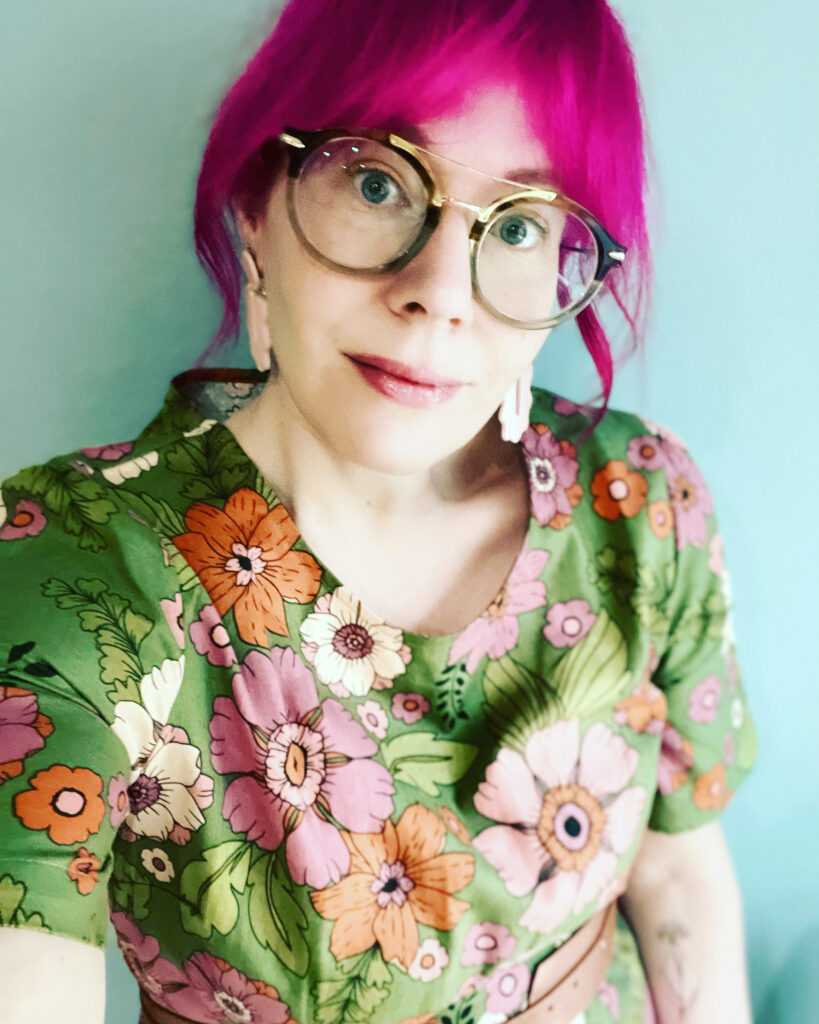
We want you to brag about yourself. What are your top personal or professional accomplishments?
My top professional accomplishment is landing my dream job at ACC. I have worked in several higher education institutions, as well as K-12. This is the EXACT place I want to be, and I am very grateful I am here.
My top personal accomplishment is my progress as a baker. I have taken pastry courses at ACC and have also learned independently. While I don’t want to do this as a career, I am grateful that I am continuing to improve and learn for the sake of personal growth (though the baked goods are a lovely part as well). I am also proud of the strong relationship I have with my husband of over 10 years, Jon. We are still each other’s biggest supporter, and he’s my favorite human. [Watch Amber’s baking skills in action here.]
Why do you think it’s important for the college to commemorate Women’s History Month?
I believe the institutions that amplify the voices and experiences of varied populations will have more robust offerings, student experiences, and staff experiences. ACC has always done a great job amplifying the voices and experiences of varied perspectives.
This year’s theme is “Celebrating Women Who Tell Our Stories.” It recognizes women, past and present, who have been active in all forms of media and storytelling including print, radio, TV, stage, screen, blogs, podcasts, news, and social media. Who is your favorite female storyteller?
My favorite female storytellers are bell hooks (sic), Angela Davis, Judy Blume, and Shonda Rhimes.
Do you have any books, films, podcasts, etc. to recommend for Women’s History Month?
Books:
bell hooks (sic): “Teaching to Transgress”
Angela Davis: “Freedom is a Constant Struggle”
Films:
Women-directed faves: “Selma,” “A League of Their Own,” “Turning Red,” “RBG,” “13th“
Podcasts:
“You’re Wrong About” (talks about misunderstood events, such as Tanya Harding)
“Crime Junkie” (money goes toward solving cold cases)
What is one challenge women still face when it comes to equality today?
Bodily autonomy when it comes to laws, equal pay, and feeling safe while walking or running alone.
Name a woman who has had a big influence on your life personally. How did she inspire you?
My Grandma Dolly was one of the “Rosie the Riveters” who worked on the lines during the war in Detroit. She was a single woman raising children while working in the automotive industry. She had her own home, which was meticulously cared for, and was a prominent member of her community. My Grandma Dolly was honest, authentic, joyous, and loyal. She’s one of my biggest role models. She died before I was married or before I became a professor and earned a Ph.D. However, she was there in spirit as I experienced those milestones. She also had bright red hair and meticulously drawn-on eyebrows — as a result, in some pictures, we look similar.
How do you work to support other women?
I am a member of the Human Rights Campaign, which helps support the LGBTQIA+ community. I am a heterosexual, cisgender woman, but I think one often overlooked area of women’s rights is the rights of our transgender sisters, most notably transgender women of color. It is crucial that initiatives supporting women include the voices of those further marginalized through the intersectionality of LGBTQIA+ status or race.
If you were in a profession not traditionally occupied by women, what advice do you have for other women interested in the profession? What advice would you give men?
Women: Throw your hat in the ring for leadership opportunities and opportunities to have a seat at the table, whichever table that may be. If there are no chairs, bring your own.
Men: Please provide women the opportunity to share feedback and experiences. Additionally, it is crucial that we emphasize opportunities for women who identify as minorities.
What can we do to empower the next generation of young women?
Show them what powerful, kind, bold, successful women look like. Also, be transparent about struggles and challenges along the way. My journey here was not a straight line, and there were obstacles. The more authentic women in leadership roles can be, the more chances for young women to see opportunities for their future selves.
Dr. Laura Marmolejo
Dr. Laura Marmolejo is the associate dean of Advanced Manufacturing. In her 20-plus years at ACC, she has previously held department chair, faculty, and Continuing Education instructional lead positions.
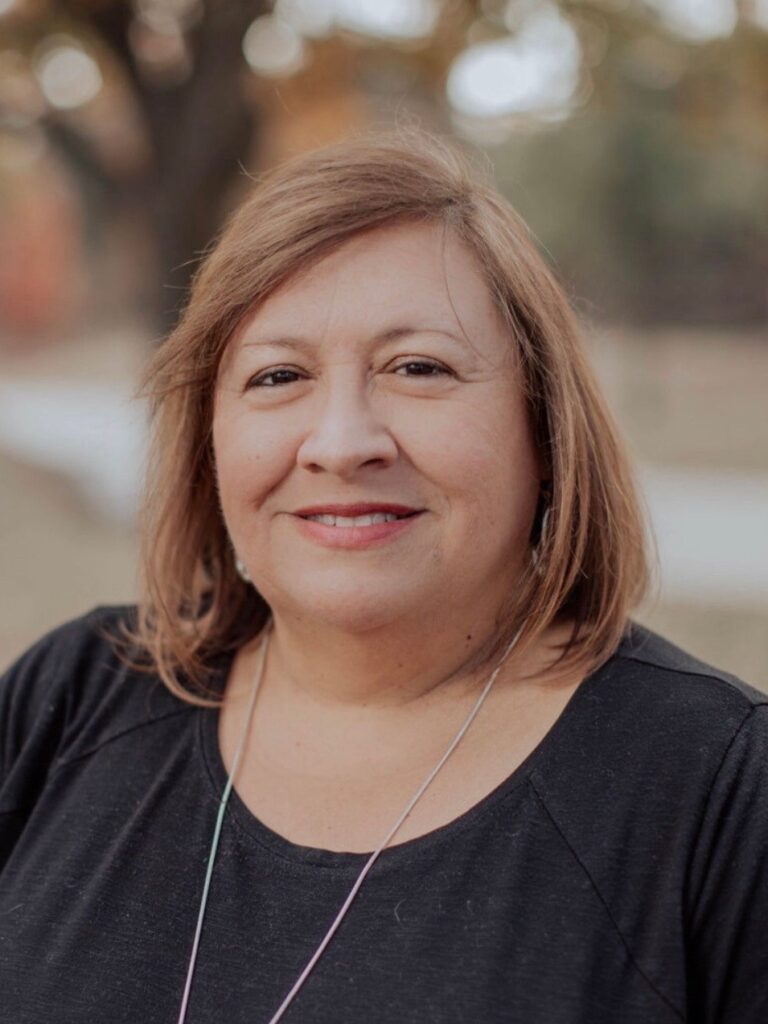
We want you to brag about yourself. What are your top personal or professional accomplishments?
I think what I am most proud of is overseeing a department that incorporates both credit and non-credit programs. I was told this would just be an experiment, but today it is a way of life here at ACC. It’s amazing to be able to help students at all levels and interests. In addition, this benefit also helps companies get employees to fill multiple roles, which again is great for the students.
Why do you think it’s important for the college to commemorate Women’s History Month?
It is important because women are still behind the curve in opportunities. And, the more young women hear about other women, the more they will learn that they too can do a variety of things in life.
This year’s theme is “Celebrating Women Who Tell Our Stories.” Who is your favorite female storyteller?
There are many great women storytellers. However, one who spoke to me was Sheryl Sandburg. She talked about how women have to be in charge in order to make a path for other women, and I agree with her. She mentioned how sometimes women hold themselves back because we don’t think we are ready, even when we are — that was true of me. Once I saw it from her perspective, I made a conscious effort to always take the opportunities and to share this notion with other women.
Do you have any books, films, podcasts, etc. to recommend for Women’s History Month?
I would recommend the book “Lean In” by Sheryl Sandburg.
What is one challenge women still face when it comes to equality today?
Women in technology still struggle to get the same opportunities as men. I experienced it 30 years ago and, unfortunately, I still see women struggling with it today.
Name a woman who has had a big influence on your life personally. How did she inspire you?
While working on my doctorate, I met many amazing women. It is hard to pick one, but what influenced me was their passion for education and their success in their field.
How do you work to support other women?
I try to mentor and share my experiences with them. I always try to encourage them to reach for their goals and not let anything tell them they can’t. Supporting women to achieve is very important to me.
If you were in a profession not traditionally occupied by women, what advice do you have for other women interested in the profession? What advice would you give men?
Advice to women: Don’t hold yourself back. Keep moving forward until YOU decide to make a change.
Advice to men: Women work differently. Learn about them so you can work together to achieve greater things.
What can we do to empower the next generation of young women?
Diversify the landscape. The more young women see other women in different roles, the more they too will have those goals. You can dream it if you can see it.
Leave a note for our interviewees or share the story of a woman who has impacted your life by clicking on the Celebration of Women’s History Month online message board below.
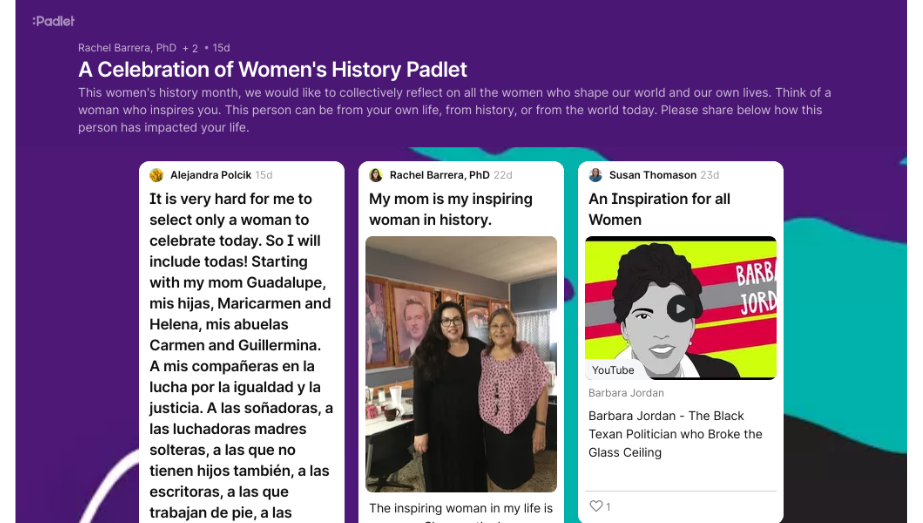
More interviews coming soon.
To participate or nominate a colleague for ACC’s Women’s History Month interview series, email [email protected].

